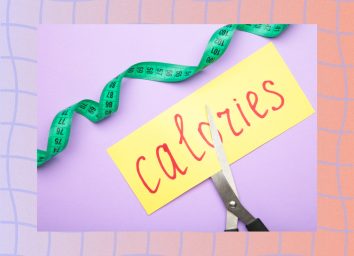This Is How Many Calories A Week You Should Eat For Weight Loss

Losing weight without taking calorie consumption into consideration is like driving a car without pressing on the gas pedal: you aren't going to get anywhere. Shedding those pesky pounds always comes back to calories, but how do you know how many calories to eat to lose weight? The answer will depend on the person.
To lower the number on the scale, you've got to take in fewer calories than usual. But just because this seems like a simple formula doesn't mean it's an easy one to follow. Weight loss results can be thwarted by cutting too much in the calorie department, cutting too little, or simply not cutting in the right places. That's why we talked to Jim White, RD, ACSM, and owner of Jim White Fitness Nutrition Studios to clear things up.
How to calculate how many calories you should eat to lose weight
Daily caloric needs are different for every person, so don't expect your sweet spot to match your workout partner's or your best friend's.
It's particular to you and you alone, and that's because we all have our own Basal Metabolic Rate (BMR). According to Healthline, this number can be found by using the Harris-Benedict formula. This formula is split by gender.
- Women: 655 + (9.6 × weight in kg) + (1.8 × height in cm) – (4.7 × age in years)
- Men: 66 + (13.7 × weight in kg) + (5 × height in cm) – (6.8 × age in years)
For even more accuracy, you should multiply your BMR by another number that's based on your activity level. So multiply by:
- 1.2 if you are sedentary (little to no exercise)
- 1.375 if you're lightly active (exercise 1-3 days a week)
- 1.55 if you are moderately active (exercise 3-5 days a week)
- 1.725 if you are very active (exercise 6-7 days a week)
How many calories do you need to cut to lose weight?
Depending on where you fall in there, White says you could lose one pound of body fat a week if you subtract 500 calories per day (or 3,500 calories per week) from this number.
For example, if you're a woman whose BMR is 1,500 and you're moderately active, that's 2,325 calories a day. To drop a digit on the scale, you'll need to subtract 500 calories from that total amount, as White suggests. This means eating 1,825 calories a day.
But that doesn't mean you should be chugging sodas and eating brownies on the reg as long as you fall under this calorie ceiling. All calories are not made equal, and a study in JAMA found that people who ate a low-carb diet lost more weight than those who ate the same calories on a low-fat diet. So consider eating more healthy fats and make sure the calories you consume aren't just adding up to your weekly goal, but doing your body favors in other ways.
Could you eat too few calories to lose weight?
Be careful never to let your calories drop below 8,400 calories a week, though. This is the equivalent of only 1,200 calories a day and, according to White, this can have the opposite effect on your weight.
"When you're not eating enough calories, your metabolism can slow down, you don't have enough energy for workouts, and you're more likely to binge eat," he says, something he refers to as starvation mode.
A study published in Psychosomatic Medicine only drills this in further because in the study, people following severe low-calorie diets didn't lose long-term weight because their body produced excess cortisol, a hormone that signals your body to store fat, especially in the abdomen.
Don't let your diet backfire like that; be mindful and follow the BMR guidelines that help you with the proper calorie amount to eat every day.








